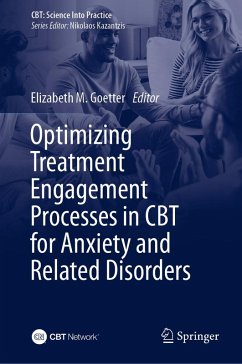This book focuses on how to effectively support treatment engagement for patients with anxiety and related disorders. The text begins from the premise that individuals already face numerous logistical, environmental, and systemic barriers to evidence-based psychotherapy. Furthermore, among anxious populations, the very symptoms that require treatment-namely, avoidance and fear-based cognitions--can deter treatment seeking. Thus, it is critical to understand how best to support treatment engagement once access barriers are overcome. Summarizing the state of the research and integrating practical application, this volume lays out the ways to maximize patient engagement and optimize treatment outcomes in cognitive behavioral treatments for the range of anxiety and related disorders.
The reader will gain:
· · · Clinical strategies and practical guidance for optimizing treatment engagement
Dieser Download kann aus rechtlichen Gründen nur mit Rechnungsadresse in A, B, BG, CY, CZ, D, DK, EW, E, FIN, F, GR, HR, H, IRL, I, LT, L, LR, M, NL, PL, P, R, S, SLO, SK ausgeliefert werden.









